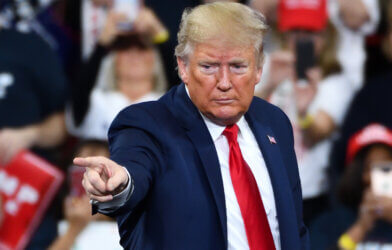BERKELEY, Calif. — You can cut the tension with a knife when some families bicker about politics. The subject continues to cause an unhealthy rift across the nation, especially on social media. Many believe if they can listen to one another, open up with each other, and have a heart-to-heart talk, it might help resolve these differences. Unfortunately, one study says that’s not the case.
Researchers from the University of California-Berkeley say that brief conversations between Democrats and Republicans about sensitive political topics don’t narrow divisions. When talking about neutral topics, the team did find some goodwill, but the effect didn’t last.
“There’s an assumption that these conversations will have positive consequences for democracy,” says study co-author David Brockman, a political scientist at UC Berkeley, in a university release. “Under this assumption, someone might say, ‘I’ve gotten to know the other side, and I like them more, and so now I’m more OK with my representative working with a representative from the other side, and I’m less likely to vote for a politician in my party who’s going to try to disenfranchise the other side.’”
“Basically, though, we didn’t find any of that. Simply liking the other side’s voters more doesn’t appear to affect your political behavior.”
Emotions can run high on social media when names like Marjorie Taylor Greene, Alexandria Ocasio-Cortez, Donald Trump, and Joe Biden start to trend. A growing number of organizations across the United States are working to bring Americans from different political spectrums together to bridge the contentious divide.
Brockman says his study doesn’t contradict those organizations’ efforts. Instead, the research helps to gauge what kind of engagement works to ease political polarization and how to make positive results deeper and long-lasting.
Good conversations only calm things for 3 months
Brockman and his colleagues conducted two experiments during the study. The first experiment paired up hundreds of Democrats and Republicans for brief, one-on-one discussions about what makes a perfect day. There was a massive reduction in polarization during these conversations, but within three months, the reductions had pretty much disappeared.
For the second experiment, researchers repeated their first test, but also brought Democrats and Republicans together for one-on-one discussions about tense political topics. The participants were then split into two groups. One group had to talk about why they identify with their respective parties and the other group discussed why they disliked each other’s party.
The experiments showed that these conversations had virtually no effect on reducing polarization. However, researchers say the study did produce “some intriguing insights about how we can all get along.”
When participants talked about what they liked about their own parties, they felt their discussion partners weren’t really listening to them. These conversations usually lasted about 13.5 minutes. On the other hand, those assigned to discuss what they disliked about the opposing political party had an easier time, as their conversations lasted 18 minutes.
People are ‘lukewarm’ about their own party
Even though these conversations didn’t change any opinions, participants were more likely to say that cross-party conversations are important. The results even suggested there was a slight drop in polarization and increases in warmth toward people in opposing parties.
“People tend to think their party is OK, but they don’t love their own party,” explains Brockman. “Their feelings are lukewarm. And so when someone else says, ‘Here’s what I don’t like about your party,’ most people will agree and say, ‘Yeah, my party isn’t perfect.’”
Brockman adds he’s surprised none of the conversations turned ugly like they often do on social media — with all of the discussions in this experiment maintaining a civil tone.
“None of the conversations that I looked at devolved into the kind of arguments that you would see on Facebook,” says Brockman. “Our research participants didn’t leave hating each other more. In some ways, this is maybe better than people would have expected.”
“When we think about the other side, we tend to think about the people who show up on social media saying the most extreme things in the most uncivil way. But that really is not how the average person interacts when they’re actually talking face-to-face.”
Brockman says further research could shed light on how to reduce political polarization and produce other democracy-enhancing effects.
The study is published in the journal Science Advances.




